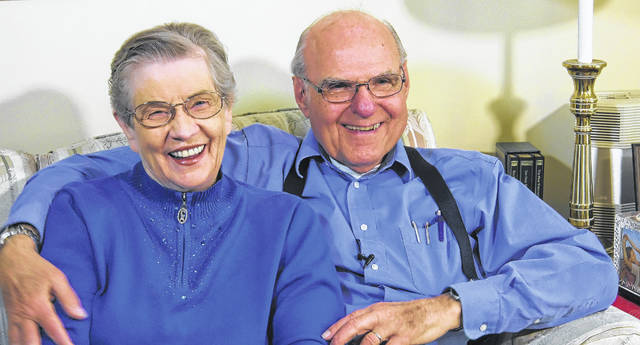
Wanting to do anything she could so others wouldn’t have to go through what she has, Delaware resident LaVonne Moore participated in a study that slowed down the decline in problem-solving and decision-making skills due to Alzheimer’s disease.
Moore was one of three patients to participate in a deep brain stimulation study (DBS).
In the study, wires were implanted into specific regions of the brain to determine if using a brain pacemaker could improve cognitive, behavioral, and functional abilities in patients.
Tom Moore, LaVonne’s husband of 65 years, said his wife noticed she was having problems with her memory. He said she was the host of a morning talk show program for a radio station in Bucyrus.
“She said she had to be taken off the air because she couldn’t remember her questions,” he said. “That was 20 years ago. She has now had Alzheimer’s probably longer than anybody. It sounds bad, but that’s a good thing because it shows that we’re doing something right.”
Mr. Moore said when their family doctor confirmed the diagnosis, they were told there wasn’t anything that could be done.
“We didn’t accept that answer,” he said.
As they looked for solutions, they were told that the director of the Division of Cognitive Neurology at Ohio State’s Wexner Medical Center and a co-author of the DBS study, Dr. Douglas Scharre, would like to see them.
“We have a lot of tools and treatments to help Alzheimer’s patients with memory, but we don’t have anything to help with daily tasks such as making the bed, choosing what to eat, and socializing with friends and family,” Scharre states in a press release from the Wexner Medical Center. “The frontal lobe is responsible for things like problem solving, organization and good judgment. By stimulating this region of the brain, patients’ cognitive functionality declined more slowly than a typical Alzheimer’s patient.”
Scharre collaborated with neurosurgeon Dr. Ali Rezai, the former director of Ohio State’s Neurological Institute who now leads the Rockefeller Neuroscience Institute at West Virginia University.
“This DBS brain pacemaker technology is commonly used to treat Parkinson’s disease and tremors. Our study findings suggest that modulation of frontal lobe networks by DBS holds promise for improving connectivity, cognitive and functional performance, and should be further studied in Alzheimer’s disease,” Rezai states in the press release.
Mr. Moore said the study lasted 18 months and was conducted several years ago in 2014, and “LaVonne is doing pretty well.” He said the disease isn’t a steady decline, it is more like a plateau and then a sudden drop.
“The treatment has extended the plateaus,” he said. “There is no cure, but the progression of the disease has been slower after she had the deep brain stimulation.”
Mr. Moore said even though the study is over, LaVonne still has the implant and that the two of them will sit every couple of days to recharge the batteries. He said he believes it still helps, and he isn’t the only one to notice.
“The therapist said she has improved,” he said.
According to the press release, researchers said after two years of deep brain stimulation, LaVonne Moore could initiate preparations of a simple meal, organize an outing that includes arranging transportation and destination, planning for the weather, and bringing the needed money. She also regained independence to select her clothing.


